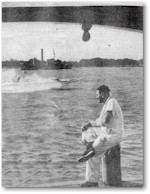1948 APBA Gold Cup
Detroit River, Detroit MI, August 28, 1948
Editorial
By Malcolm Lamborne Jr.
A modern Gold Cup boat represents a staggering investment of time and money. The least expensive new outfit is said to have cost $7,000 in cash plus uncounted thousands of hours of time on the part of her amateur designer and builders. On a fair cost accounting basis, it can probably be said that the average Gold Cupper represents a cost of $25,000.
At the recent disastrous contest for this class staged by the Detroit International Regatta Association, 15 eligible boats crossed the starting line -- $375,000 worth of race boats, according to our figures. Only one of the fifteen was credited with finishing the 90-mile race and this one sank within minutes of completing the race. Most of the 15 starters were damaged -- some so badly that they can never be satisfactorily repaired. In other words, Detroit's race on August 28th disabled, discredited or destroyed more than a third of a million dollars' worth of racing craft.
_thumb.jpg) |
| 'My Sweetie' Hits a Sweet
100 mph in Gold Cup Trial Detroit boat is ready at last for Saturday's Gold Cup race ... Wild Bill Cantrell is driving craft owned by Ed Schoenherr and Ed Gregory |
 |
| Dan Foster, driving Miss Great Lakes
from between two rivals to win second heat ...Al Fallon's giant speed boat was running its fourth Gold Cup Race in four years |
 |
| Guy Lombardo, left arm broken watches Miss
Great Lakes ... hurt when his Tempo VI sank, he hurried from hospital to see the race |
As a result of that afternoon's racing:
a) The owners of the boats involved find themselves faced with staggering bills for repair
or replacements.
b) In the one serious accident that occurred, boat racing's most famous driver, Guy
Lombardo, was treated to a spill that hospitalized him with a fractured arm. This was a
left-handed stroke of luck since Lombardo and the two other persons involved were lucky to
escape with their lives.
c) Radio commentators, newspaper reporters -- and inevitably, Mr. Public -- are quite
willing to state that power boat racing is a farce.
Speaking for myself and the other editors of Yachting, I feel that such a performance should never be allowed to recur.
Owners, drivers, and experienced observers on the scene agree that the primary cause of the tragic outcome was the rough water prevailing from several hours before the race to some time after the finish. The seas were just too heavy for running anything except heavy, slow-speed boats. Yet no attempt was made to delay the Gold Cup heats until conditions improved.
The latest APBA rule book cites the following rule on Gold Cup postponements (and no change has been approved since that ancient day when the last book was published): "7. No postponements from the advertised time of the start of the race shall be allowed for any cause, except in the interests of the safety of the public or the contestants."
Robert Schelling, Secretary of the Inboard Racing Commission, has advised me that this rule is intended to cover just the sort of conditions that prevailed on the Detroit River this year, which certainly proved to be adverse to the "interests of the safety of the contestants."
To those of us who live and love racing, the Gold Cup is the annual American classic. In the minds of many race committees, it is the great American spectacle. This antipodal difference in basic concept explains much of the difficulty encountered in recent race management, including the fiasco at Detroit.
For the good and safety of the real boatmen involved, it is high time that steps were taken to change either the rules that permit such a catastrophe, or those officials who appear to be more concerned with the interests of the spectators than the welfare of the participants.
(Reprinted from Yachting Magazine, October 1948)
Hydroplane
History Home Page
This page was last revised
Thursday, April 01, 2010.
Your comments and suggestions are appreciated. Email us at wildturnip@gmail.com
© Leslie Field, 1999